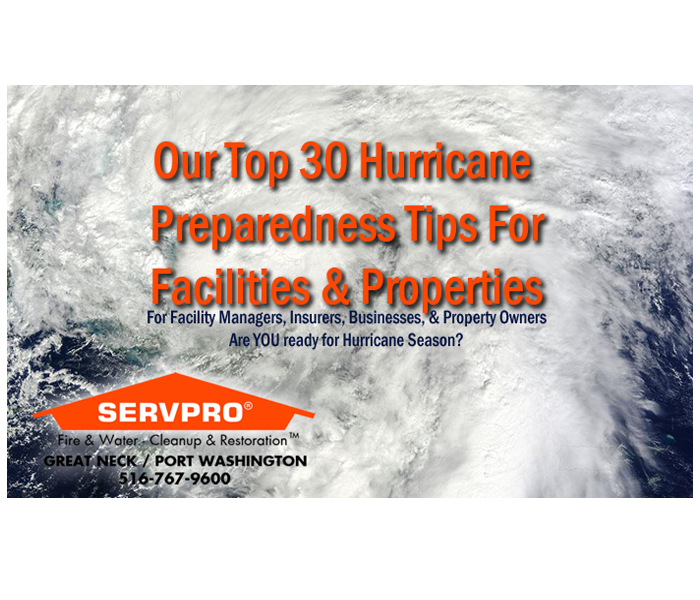Our Top 30 Hurricane Preparedness Tips For Facilities & Properties
7/14/2015 (Permalink)
#1 Check and secure items on roofs (antennas, fans, turbines, covers, HVAC units), yards, and in open vehicles to prevent items from going airborne or suffering flood damage.
#2 Have clean up/board up materials and PPE Personal Protective Equipment on hand - including protective eyewear, gloves, respirators, dust masks, hammer, nails, drill, screws, plywood, furring items that can become strips, ladder, heavy duty plastic sheeting (4mm or thicker), brooms, mops, pails, trash bags - note that we offer 24/7 board up/clean up service if needed
#3 Distribute an emergency contact list for all staff or tenants and let everyone know in advance how communication will occur
#4 Develop emergency staff assignments to predetermine chain of command - who will perform what, where, and how
#5 Minimize flood losses - relocate critical systems above flood levels and move at risk items - interior equipment, furnishings, or documents to higher or safer locations - as much as 90% of property damage caused by all natural disasters is a result of flooding
#6 Make sure any flood prone areas are clear of electrical hazards that could energize water and injure someone
#7 Ensure all emergency lighting is operational
#8 Brace and secure any roll up doors
#9 Have emergency contact numbers for your local police, fire, rescue, area hospitals, and your insurance agents
#10 Do a risk assessment - identify potential threats to your building due to your location and environment - periodically walk and photograph your facility and vital contents for your insurance adjustor, backing up off-site
#11 Have mobile devices charged at all times and have a power plan for extended outages
#12 The FCC recommends limiting non-emergency calls that congest and overwhelm networks during crisis - text instead
#13 Make sure interior building emergency exit paths are clear and doors are not blocked, locked, or chained
#14 Review your company's Disaster Management Plan, they are often required by OSHA for employees (who has a free eTool) - and contact us to do a free Emergency Ready Profile for your building
#15 Shut off non-essential electrical equipment and protect vital digital data, equipment, and software programs with UPS - Uninterruptible Power Supply
#16 Trim all trees and bushes to make them more wind resistant
#17 Have generators maintained regularly, and keep adequate fresh fuel on hand
#18 Make sure all or key members of staff know how and where to turn off the main power, switch boxes, water, gas, and equipment in emergencies (this info is detailed in our ERP)
#19 Notify your key suppliers, vendors, shippers, customers, and contractors if there is a disruption in your area or an alternate plan, and even if you were not affected - as they may be concerned if the event is in the media
#20 If you have critical vendors that you use, see if they have a disaster plan and contingencies should they experience a disruption themselves so your operations are not affected
#21 Review your insurance policies to determine what disasters you have coverage for and what is not covered, seek out supplemental insurance if necessary
#22 Keep staff first aid training current - know who has medical or volunteer firefighter and EMT training
#23 Have alternative space arrangements in place or at least in mind if you need to operate the business elsewhere if your facility is temporarily disabled
#24 Back up your data, 30% of all businesses that back up their data now do so because they have lost data before
#25 Sign up for emergency alerts and apps to your cell phone
#26 Develop and maintain an evacuation plan for your facility, conducting periodic drills for staff
#27 Create a security procedure for a damaged facility to control access in order to protect property and assets
#28 Check water supply for contamination after an event
#29 Make sure any hazardous materials are safely contained
#30 Have a go-to list of qualified professionals to use for the inspection of the building's stability, systems, and equipment (including air safety and electrical) after an event to ensure all are safe and operational for employees to return and use
SERVPRO of Great Neck – Port Washington is located on Long Island, in New York.




 24/7 Emergency Service
24/7 Emergency Service
